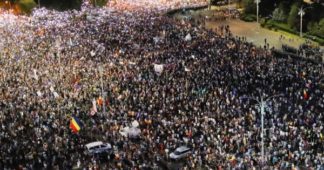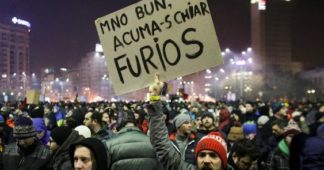Even assuming the voting process itself were flawless, the election was “rigged” from the moment the November results were annulled and leading candidate Georgescu was barred from running
By Thomas Fazi
May 20, 2025
The farce of Romania’s presidential election came full circle yesterday, as Bucharest’s pro-EU centrist mayor, Nicușor Dan, secured a decisive 8-point victory over his right-wing rival, George Simion. Establishment voices across Europe — and beyond — were quick to hail the result as a “victory for democracy”. Orwellian, to say the least, considering how blatantly democratic principles were undermined throughout the entire electoral process in Romania.
Dan’s victory comes in the wake of a series of events that have severely undermined Romania’s democratic credibility. Last November, the independent eurosceptic and NATO-critical candidate Călin Georgescu won the first round of the presidential election in a surprise result. However, before the runoff could take place, Romania’s constitutional court annulled the outcome, citing alleged but unproven Russian interference.
The intelligence dossier presented against Georgescu — “declassified” and published by Romania’s then-president Klaus Iohannis two days before the ruling — provided no clear evidence of foreign interference or even electoral manipulation. It simply pointed to the existence of a media campaign supporting Georgescu that involved around 25,000 TikTok accounts coordinated through a Telegram channel, paid influencers and coordinated messaging. In other words, Romania’s top court annulled an entire election based on entirely unsubstantiated claims of foreign interference.
Even more incredibly, a Romanian investigative outlet subsequently revealed that the TikTok campaign used to justify the cancellation of the election was actually paid for by the ruling National Liberal Party — the very party that supported cancelling the elections, and from which the country’s former president, who played a key role in the whole affair until his resignation last month, originated.
A new election date was set for May, but many questioned how the establishment could prevent a repeat of the November results — especially since the entire charade only strengthened support for Georgescu. The answer came in March, when the electoral commission disqualified Georgescu from running altogether. Particularly striking is the fact that the electoral commission’s ruling was based on the “foreign interference” allegations used by the constitutional court to annul the first round of the presidential election, even though these had been debunked. A lower appeals court temporarily reversed the decision, the High Court of Cassation and Justice ultimately upheld it.
Meanwhile, Romanian prosecutors opened criminal proceedings against Georgescu on charges ranging from “incitement to actions against the constitutional order” to setting up an organisation with “fascist, racist or xenophobic characteristics” to antisemitism — even though Georgescu’s campaign focused primarily on economic policy and Romania’s geopolitical orientation.
In short, when smear campaigns by the mainstream media and established political parties failed to stem Georgescu’s rising popularity, the Romanian state mobilised nearly every institution against him — the courts, the police and even the secret services. The objective was to eliminate Georgescu from the equation by any means necessary. And they succeeded.
There is ample reason to believe Romania’s moves were not purely domestic. Given the country’s strategic role in NATO and the war against Russia, it is highly plausible that these actions were taken under pressure from — or in coordination with — Washington and Brussels. Romania’s airbases play a key role in NATO logistics and training, and in the Alliance’s proxy war in Ukraine; Georgescu’s strong anti-NATO and anti-war positions thus rendered him intolerable to the Euro-Atlantic establishment.
Georgescu’s exclusion paved the way for the rise of George Simion, the leader of the nationalist Alliance for the Unity of Romanians (AUR), which had previously backed Georgescu and pledged not to run against him. He launched his campaign after Georgescu was barred, portraying himself as a defender of democracy and national sovereignty and even suggesting he would appoint Georgescu as prime minister if given the opportunity.
In the first round of the new elections, on May 5th, Simion won by a large margin — securing twice as many votes as Nicușor Dan. But why was Simion, unlike Georgescu, allowed to run in the first place? I posited that the answer lies in the type of populism he represents. On the one hand, Simion holds much more radical positions than Georgescu on cultural and identity issues; on the other hand, however, he is significantly more aligned with establishment interests on crucial issues such as NATO, European integration and the war in Ukraine.
I suggested that Simion represents a new and increasingly common type of political actor: the faux-populist who combines strident cultural nationalism with loyalty to the economic and geopolitical status quo. This dual identity makes these characters ideal for co-option by the establishment in the latter’s attempt to respond to the populist backlash by promoting — or at least tolerating (even while publicly rebuking) — leaders who channel nationalist sentiments while leaving core power structures untouched.
In the end, however, this “plan B” turned out to be unnecessary, as the establishment’s preferred candidate, Dan, secured victory.
Simion has alleged that the Moldovan government was rallying the diaspora there against him and also claimed that other friendlier diasporas’ polling stations didn’t have enough ballots. He has also said to have found millions deceased citizens in the electoral registries. Time will tell — perhaps — whether these allegations have any merit. But ultimately, even if the voting process itself were flawless, the truth is that the election was “rigged” from the moment the November results were annulled and Georgescu was barred from running. And this is not even considering the massive media and online campaign waged against Georgescu — and then Simion. Indeed, Telegram founder Pavel Durov revealed that he was asked by the French intelligence chief’s request to ban conservative Romanian accounts.
France played a key role in this whole affair. Last December, just hours before the constitutional court annulled the election, the pro-EU candidate running against Georgescu, Elena Lasconi, posted a conversation with Macron on her Facebook page in which the French president issued several thinly veiled threats about the grave consequences a Georgescu victory would have for Romania. Moreover, just a few days before the electoral commission’s ruling against Georgescu, the French ambassador paid a visit to the president of the Romanian constitutional court, in which the two reaffirmed the importance of resisting “the penetration of populism into the decisions or rulings of a constitutional court” — an apparent reference to the criticisms of the court’s decision to annul the election results.
In short, to the extent that there was a foreign hybrid attack against Romania, it wasn’t waged by Russia — but by the transatlantic establishment, through foreign pressure, fabricated intelligence reports, foreign-funded “civil-society organizations” and judicial subversion. The events in Romania represent a new and fateful step for Western societies that claim to be liberal and democratic. Elites no longer limit themselves to influencing electoral outcomes through media manipulation, censorship, lawfare, economic pressure, and intelligence operations. When these fail to achieve the desired result, they are increasingly willing to discard the formal structures of democracy altogether, including elections.
The strategy is simple: keep rerunning or meddling in elections until the “correct” result is achieved — preferably by making sure that only candidates acceptable to the establishment appear on the ballot in the first place. By now, it should be evident to all that the Western electoral process has been reduced to little more than a mechanism for legitimising oligarchic rule.
Therefore, what transpired in Romania should be seen as a warning sign of what may soon unfold elsewhere. It’s important to realise, however, that this anti-democratic drift has been a long time in the making. Indeed, one may argue that Western liberal-democratic states have been operating in a permanent state of exception for some time. The ease with which basic freedoms and constitutional guarantees were cast aside during the pandemic provided ample evidence of this. Ruling elites are able to do this because there is little in the way of organised mass resistance to challenge them.
For a brief thirty-year period following World War II, the masses succeeded in leveraging democratic institutions to wrest a measure of economic and political power from entrenched oligarchic elites, but the material conditions that made that possible — first and foremost the organised power of labour — no longer exist. In retrospect, the brief period of (relative) popular sovereignty was an exceptional, geographically limited deviation from the historical norm, sustained by unique material and political conditions. Indeed, countries like Romania never even experienced that, having gone straight from communist rule to neoliberal post-democracy. The two pillars of the transatlantic alliance — the European Union and NATO — have advanced Europe’s anti-democratic trends, leading the charge in undermining democratic processes and suppressing popular self-determination.
What we are witnessing is not the “degeneration” of Western liberal democracy, an unfortunate deviation from the historical norm, but rather its logical conclusion. States that were once briefly responsive to popular demands have now returned to the function state institutions have had throughout most of capitalism’s history — preserving elite power at all costs.
We remind our readers that publication of articles on our site does not mean that we agree with what is written. Our policy is to publish anything which we consider of interest, so as to assist our readers in forming their opinions. Sometimes we even publish articles with which we totally disagree, since we believe it is important for our readers to be informed on as wide a spectrum of views as possible.











